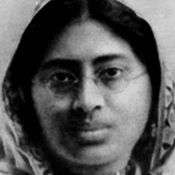Saroj Nalini Dutt
| Saroj Nalini Dutt MBE | |
|---|---|
|
Saroj Nalini Dutt | |
| Born |
9 October 1887 Bandel, Hooghly, Bengal Presidency, British India |
| Died |
19 January 1925 (aged 37)[1] Calcutta, Bengal Presidency, British India |
| Nationality | British India |
| Occupation | Social Worker, Feminist |
| Religion | Hinduism |
| Spouse(s) | Gurusaday Dutt |
| Children | Birendrasaday Dutt |
| Parent(s) |
Brajendranath De Nagendranandini De (née Bose) |
Saroj Nalini Dutt, MBE, (9 October 1887 – 19 January 1925) was an Indian feminist and social reformer.
Background
Saroj Nalini De was born in her father’s country house in Bandel, near Hooghly, in Bengal Province.[2] Her father was Brajendranath De.[3] She was brought up with her brothers and sisters and shared with them an education under a tutor and a governess. Members of her paternal family frequently visited the Brahmo Sammilan Samaj in Bhowanipore, Calcutta. [2]
In 1905, she married Gurusaday Dutt. In 1909, her only child Birendrasaday was born.[4]
Career
Saroj Nalini Dutt was a social reformer, educationist and a pioneer of the movement for the uplifting of women in Bengal. She pioneered the formation of Mahila Samitis (women's institutes) in Bengal Province and helped them receive vocational training to be able to earn for themselves and support their families. She was particularly concerned about the plight of Hindu widows. She realised that as it was not possible to send mothers to school, they needed to be educated by other means, such as Mahila Samitis in the district towns in Bengal and then gradually in each and every village. She wanted the purdahnashin ladies to first meet amongst themselves, then possibly keep an eye on the local hospitals of their respective towns and villages, and then attend Adult education classes to educate themselves. Later, the ladies could then go back and educate the rest of their family members.
Dutt started her first Mahila Samiti in 1913 at Pabna (now in Bangladesh) with the object of developing friendly cooperation among the purdahnashin ladies. Subsequently, she started the Mahila Samitis of Birbhum (1916), Sultanpur (1917), and Rampurhat (1918). The Mahila Samiti she started in 1921 at Bankura dedicated itself to social upliftment and to education of rural women. It started training midwives and established a maternity home. She also took the lead in introducing the charka (spinning wheel) in village homes. She reorganised the local girls’ school in Birbhum, which was called Sir Rivers Thompson School.
She became the Secretary of the Indian Section of the Calcutta League of Women’s Workers (later Bengal Presidency Council of Women), Member of the Council of the Nari Siksha Samiti (Women’s Educational League), and Member of the Calcutta Municipal Corporation’s committee which was to make suitable arrangements for allowing women to elect councillors. She was also the Vice President of the Sylhet Union, an association set up for the promotion of female education in Sylhet district.
In recognition of her work in the field of social welfare, she was awarded an M.B.E. in 1918.[4]
Legacy
After her death her husband Gurusaday Dutt founded The Saroj Nalini Dutt Memorial Association (1925) as the apex body for all the Mahila Samitis in Bengal. This body was later affiliated to the Associated Country Women of the World, an international organisation dedicated to the upliftment of the status of women worldwide. This organisation's activities were greatly expanded by her daughter-in-law Aroti Dutt, who was president of the association from 1972 and 2003.[5]
References
- ↑ Sengupta, Subhodh Chandra; Basu, Anjali, eds. (January 2002). "সরোজনলিনী দত্ত" [Saroj Nalini Dutt]. Samsad Bangali Charitabhidhan (Bibliographical Dictionary) (in Bengali). Volume 1 (4th ed.). Kolkata: Shishu Sahitya Samsad. p. 565. ISBN 81-85626-65-0.
- 1 2 Gurusaday Dutt, A Woman of India: Being the Life of Saroj Nalini Dutt, Founder of the Women's Institute Movement of India (Calcutta, 1926).
- ↑ Forbes, Geraldine (1996). Women in Modern India. Cambridge. pp. 28–29.
- 1 2 Kundu, Rajib, (tr. & ed.), Saroj Nalini: Shankhipta Jibani, (Ababhash, Kolkata, 2014), pp. 78, 84, pp.111-116, (translation of her husband Gurusaday Dutt's A Woman of India: Being the Life of Saroj Nalini (Founder of Women's Institute Movement in India (with a forward by Rabindranath Tagore), (Humphrey Milford, Oxford University Press, 1941).
- ↑ Saroj Nalini Dutt Memorial Association
